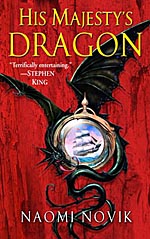
![]() Nymeria
Nymeria
4/28/2014
![]()
Two chapters. That's how much it took me to fall in love with this book and its main character, Temeraire. A dragon. A talking dragon.
My previous experience with these creatures was limited to Smaug fromThe Hobbit and to GRR Martin's dragons, the latter being only little more than background scenery in the vaster tapestry of his huge saga - at least for now. In short, my labels for dragons were dangerous, devious, killers - and so forth.
Temeraire changed all that, much as he changes his human companion's life in the book.
In this alternate-history novel, set in the time of the Napoleonic wars, Captain William Laurence of the Royal Navy finds a dragon egg on a captured enemy ship, and from it emerges a beautiful black dragon, who he promptly names Temeraire. The handling of dragons is carried out by the Aerial Corps, a special division of His Majesty's forces, and these men - and women! - live apart from the rest of the military, because of the singular quality and requirements of their charges, and also because of some "taint" attached to the duty. So it happens that Laurence abandons a promising Navy career to become something of an outcast in the eyes of his comrades and - worse - of his own family. Hopefully in the next books this will be explained in depth, for I'm very curious to see where the general attitude comes from: in this alternate world there is no glamour attached to aviators, they are looked at with suspicion at best, if not with open distaste. Yet we learn that they are trained from early childhood because they have to learn while their mind and bodies are still pliable, and that their own families send them to "dragon school". I'm curious to learn more about the general populace's distorted perception and the reasons for it, even though some inklings are already presented in the course of the book - as the less restrained customs observed by the Aerial Corps in the matter of personal relationships, for example.
Things are even more difficult for Laurence because he comes to this life in his adult years, and he has to face his new comrades' doubts about his capabilities, while battling with his standoffish character at the same time. This two-sided isolation brings Laurence and Temeraire quite close in a very short time: Ms. Novik describes the process with an easy believability that's a joy to observe. Laurence is somewhat too stiff and formal, both as a personal inclination and as a duty requirement, so his slow opening toward Temeraire's almost childish innocence and curiosity engenders the joy of mutual discovery and the reader's pleasure in seeing this man lose his severity and become a more likable character.
Here lies one of the winning choices of the book: a common trope of the genre would have had Laurence's character more inclined toward roguishness and careless bravado, while his steadfast adherence to protocol and rules - one that makes him a bit boring and lackluster at first - helps put a higher shine on his later transformation, and makes the transition and his friendship with Temeraire much more real and satisfying for the readers.
Temeraire remains the undisputed protagonist though: even though the book is written through Laurence's point of view, the world is often observed - and commented - from the dragon's perspective, from his interaction with the humans and the other dragons serving with His Majesty's forces. Temeraire is adorable indeed - not in a "cute" way, but because he's very articulate and very innocent at the same time; innocent and yet full of wisdom: Ms. Novik managed to walk in a seeming effortless way along this thin dividing line, and to offer her readers a believable, lovable creature. And this happens for the other dragons as well: their devotion to their human companions, or their suffering in case of criminal neglect - as is the case in one notable instance in the book - helps to see them in a very different light, as thinking and feeling creatures who deserve our respect. And affection.
If I wanted to find any fault with this book I might complain of a too-quick ending: the huge build-up leading to it made me feel that the resolution was a bit too abrupt. And then there's Laurence's form of address to Temeraire: when he says "my dear" it sounds… off-key - I can't exactly say why it feels wrong, but every time it happens (and there are a few instances of it) it distracts me. I believe that "my friend" would have sounded better and more sincere, more in tune with the man's personality, and would still have fully expressed the bond between man and dragon.
Still, it's the kind of minor nitpick that does not detract from the pleasure of a highly engrossing book.
http://spaceandsorcery.blogspot.it